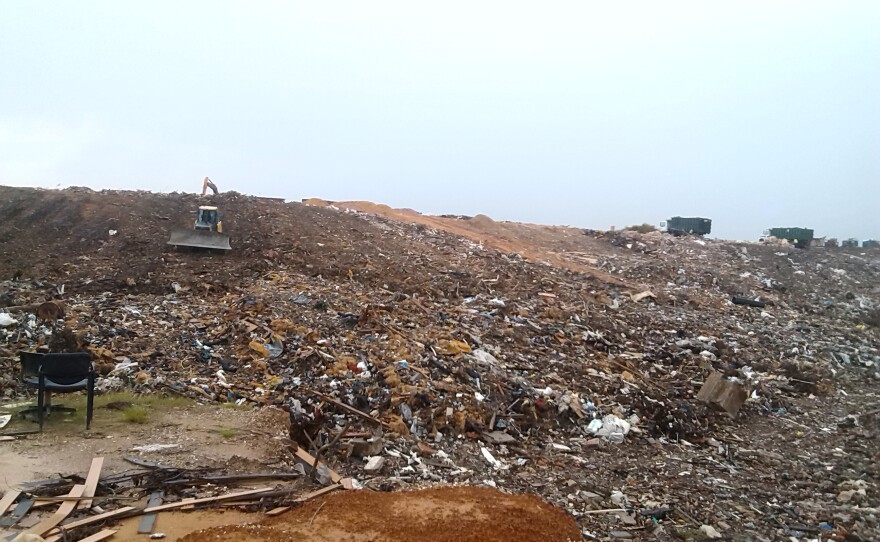The Florida Department of Health in Escambia County will continue to evaluate the results of air quality monitoring around the Wedgewood Community Center and Rolling Hills Landfill, after issuing a health alert Tuesday for elevated levels of hydrogen sulfide.
Hours earlier, Escambia County Commission Chairman Lumon May and District 2 State Representative Mike Hill toured the Rolling Hills facility and others in the area to see their impact on the surrounding community.
May organized the tour, in response to urgent pleas for help from residents in the Wedgewood, Olive Heights, and Rolling Hills neighborhoods. Their concern is the blight and pollution that has been coming from the borrow pits and landfills near their homes for the past few decades.
“It’s not going to be a fast process. We didn’t get here over night; 25 or 30 years of this. We’re not going to solve it in 25 or 30 days,” said May encouraging residents to be patient as he also pledged to do everything he can to address the situation.
“My commitment to you is we’re going to continue to work for clean air, clean soil, and clean water and I won’t rest until every child that grows up in every neighborhood has an opportunity to grow up in a clean and safe neighborhood,” he said.
May made those comments after taking a contingent of governmental leaders, residents, and media out to get a firsthand look at the pits.
Two ECAT (Escambia County Area Transit) shuttle buses were provided for the two-hour tour, which included stops at four of the C&D (Construction and Demolotion) facilities and mining pits, to get a better ‘sense’ of residents’ concerns.
“The whole goal of today is to go and inspect these sites, determine what needs to be done to correct what we see is happening now, what we’re hearing is the contamination, the smells and so forth, and see what we can do about getting that corrected,” said Rep. Hill.
The first stop on the tour was the 27 acre Longleaf C & D Facility, which the group accessed by walking through the yard of a home that has been abandoned because of how close it is to the pit. While there, it was explained that C&D pits require a 500 foot buffer; mining operations only require a 100 foot buffer.
Other stops during the tour included the nearly 30 acre Shortleaf Borrowing Pit, which reaches depths of 60 to 70 feet and the 57 acre Blossom Trail Pit.
The final stop was the Rolling Hills C&D Pit, which at 166 acres, is the largest and has generated the most complaints.
With a foul odor in the air and trucks bringing in load after load of debris to dump in the pit, Keith Wilkins, Director of the Community & Environment Department for Escambia County explained some of the citations issued to the operators of the facility.
“We do now have two ‘notice of violations’ to them for dust control, for odor, staging some of their materials in wrong places, and taking some materials that might be potentially illegal for them to accept.”
Wilkins added that the county will be lending their survey crew to the Department of Environmental Protection because they think the pit is also in violation of the allowed height of 130 feet.
Scott Miller, one of the owners of Rolling Hills C&D, admitted that over the course of the past seven years, he has received two violations, the first of which involved their acceptance of asbestos. Miller explained that “asbestos is extremely dangerous when it’s ground up and goes airborne,” adding that it’s safe as a solid because it doesn’t leach into the water.
Miller would go on to counteract allegations of excessive noise related to nighttime and Sunday landfill operations.
Back at Wedgewood Community Center, Rep. Hill and Commission Chairman May took a moment to reflect on their inspection of the pits.
Hill said he was surprised by what he saw “Until you see it with your own eyes you don’t quite recognize the extent of the concerns,” pointing out that he was most taken by the height of some of the debris, as well as the encroachment on private property.
In regards to what can be done about the pits at the legislative level, Representative Hill pointed out that it can be complicated.
“From what I’m hearing today, there are certain things that can be done within the current regulations that we have. Some of those regulations don’t seem to be stringent enough and we need to look at addressing those to make sure that if there are some concerns, there are some violations, they can be remedied much quicker,” he said.
In closing, Commission Chairman May again reassured the people that while this won’t be a quick fix, the county will be working full force towards a solution.
“I’ve instructed our staff to move very aggressively on air quality testing, water testing, and soil testing. I think our administrator clearly got the direction from the commission that we want this done very quickly. So I don’t know a time table but I can tell you the results will be gathered as quickly as possible and they will be made public,” said May.
Such testing was conducted during the tour and within hours, Escambia County health officials issued a health alert in response to elevated levels of hydrogen sulfide found in the air around the Rolling Hills landfill.
In reference to hydrogen sulfide, it’s a colorless gas which often has an odor similar to rotten eggs, but which may have no detectable smell when present in low concentrations. However, even low concentrations of hydrogen sulfide gas can have negative health effects such as eye, nose and throat irritation. The FDOH-Escambia advises people experiencing respiratory symptoms to consult their physician for treatment and to stay inside their homes.
For more information, contact the FDOH-Escambia’s Environmental Health office at 850/595-6700 or visit www.EscambiaHealth.com.








